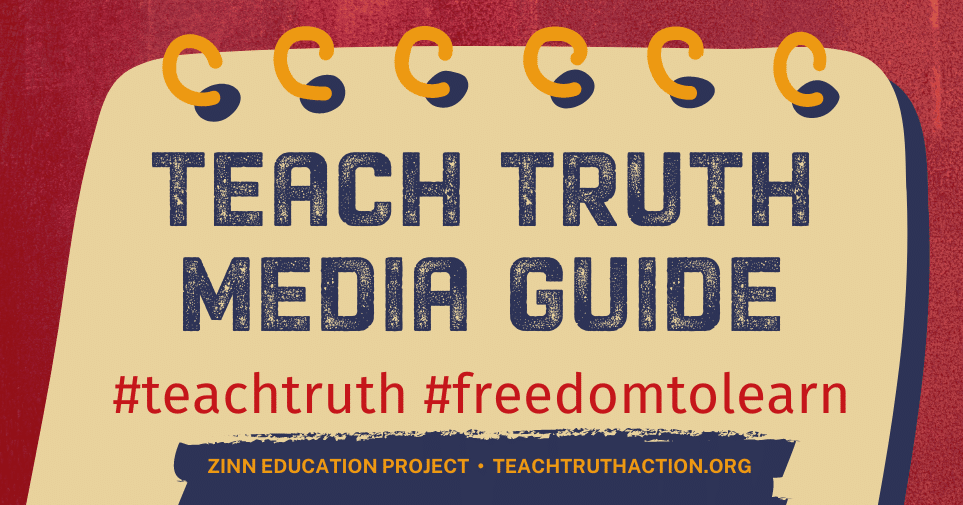Why a Day of Action?
Children’s future depends on what they learn today.
However, across the country, legislatures have passed laws to criminalize teaching honestly about U.S. history and to restrict students’ ability to ask questions and think critically. The laws’ chilling effect reaches classrooms nationwide. Textbooks and high-stakes testing have also long distorted curricula.
In this election year, that is why educators are hosting more than 170 events to challenge the media silence and encourage everyone to defend the freedom to learn.
Kansas City high school teacher and event co-organizer Michael Rebne said,
Our students demand to learn the truth even if a small group of powerful, mostly wealthy, white adults is threatened by that.
At this moment we see a rise in both Islamophobia and antisemitism, stoked by the same right-wing forces that seek to further marginalize LGBTQIA+ students and the voices of Black, Indigenous, Latinx, Asian, and all people of color.
We need to set the record straight and remember that we are stronger united.
Why else?
SNCC veteran Judy Richardson said at a Teach Truth rally last year that we organize so that “The fascists can’t stop us!”
This year many teachers and students are being attacked for speaking truthfully about Palestinians’ human rights. Mary Beth Tinker, Tinker v. Des Moines plaintiff, addresses the need to defend “U.S. students who use their free speech rights to stand up for Gaza and call for a ceasefire, which is the road to peace for Israeli youth as well.”
The climate crisis threatens students’ future, yet gets scant attention in corporate media and textbooks. The anti-history laws and book bans make a bad situation worse, as Bill Bigelow describes in, The Attack on Anti-Racist Teaching Attacks Environmental Justice Teaching.
Who and Where?
 There are events in Albuquerque, Atlanta, Baton Rouge, Boston, Brooklyn, Charlottesville, Chicago, Cleveland, D.C., Fairbanks, Hartford, Helena-West Helena (Arkansas), Indianapolis, Iowa City, Kansas City, Miami, Milwaukee, New Orleans, Newark, Richmond, San Juan, Seattle, Syracuse, Topeka, Youngstown, and dozens more cities. They are led by classroom teachers, teacher educators, librarians, NAACP chapters, unions, and more.
There are events in Albuquerque, Atlanta, Baton Rouge, Boston, Brooklyn, Charlottesville, Chicago, Cleveland, D.C., Fairbanks, Hartford, Helena-West Helena (Arkansas), Indianapolis, Iowa City, Kansas City, Miami, Milwaukee, New Orleans, Newark, Richmond, San Juan, Seattle, Syracuse, Topeka, Youngstown, and dozens more cities. They are led by classroom teachers, teacher educators, librarians, NAACP chapters, unions, and more.
More than 65 organizations are co-sponsoring the Teach Truth Day of Action, including the Abolitionist Teaching Network, the African American Policy Forum, American Library Association, Black Lives Matter at School, Black Teacher Project, GLSEN, HEAL Together, Institute for Common Power, National Education Association, SNCC Legacy Project, and more.
How to Join the Day of Action
We offer some options to engage that do not require a lot of preparation.
-
-
- Find an event near you and show up
-
-
-
- Go to a historic site and take a photo with a Teach Truth sign that you make or download. Share on social media with #TeachTruth
-
-
-
 Record a statement and/or share graphics on social media about why YOU defend the freedom to learn
Record a statement and/or share graphics on social media about why YOU defend the freedom to learn
-
-
-
- Wear a conversation-starting Teach Banned History button
-
-
-
- Make a #TeachTruth photo booth frame for you and friends
-
-
-
- Share and teach the teach truth syllabus
-
-
-
- Teach about banned books and anti-history education laws. Read about a 4th-grade class’s banned books study and share your teaching stories
-
-
-
- Get involved with the school board. Attend meetings, vote, run for office. (Learn how at HEAL Together classes.)
-
-
-
- Donate so that we can continue to organize events like these and defend the right of teachers across the United States to teach people’s history.
-
What to Say?
Our Teach Truth Media Guide is for everyone seeking to communicate with the media or others about the dangers of anti-history education legislation and book bans, the importance of teaching truthfully, and the rights of LGBTQ+ students.
Although this guide was designed for the Teach Truth Days of Action, it can be used all year.
We include responses to frequently asked questions on systemic racism, LGBTQ identity, parents’ rights, Critical Race Theory, and more. This year we’ve added FAQs on Palestine, antisemitism, and Project 2025.
Beyond Book Bans
More than half of students in the United States today are prevented from learning the truth about history by laws, corporate textbooks, and high-stakes testing. Here are just a few of countless topics that are frequently censored in classrooms.
- LGBTQ+ history and identity
- Systemic racism and sexism
- Resistance to enslavement
- Federal role in slavery
- Foundational role of enslavement and genocide of native people
- Reconstruction
- Voter suppression after 1965
- Black Freedom Movement
- Collective organizing for change (instead of just individual heroes)
- Contemporary Native Americans
- Environmental racism
- Climate change
- Policing and criminal justice
- U.S. foreign policy
- and many more.
Book bans are just the tip of the iceberg. Proponents of anti-history education bills argue they are protecting children from feeling guilty and from propaganda.
In truth, what concerns the right is young people learning to ask critical questions about our society, to organize for social change, and about the power of interracial solidarity.








Twitter
Google plus
LinkedIn